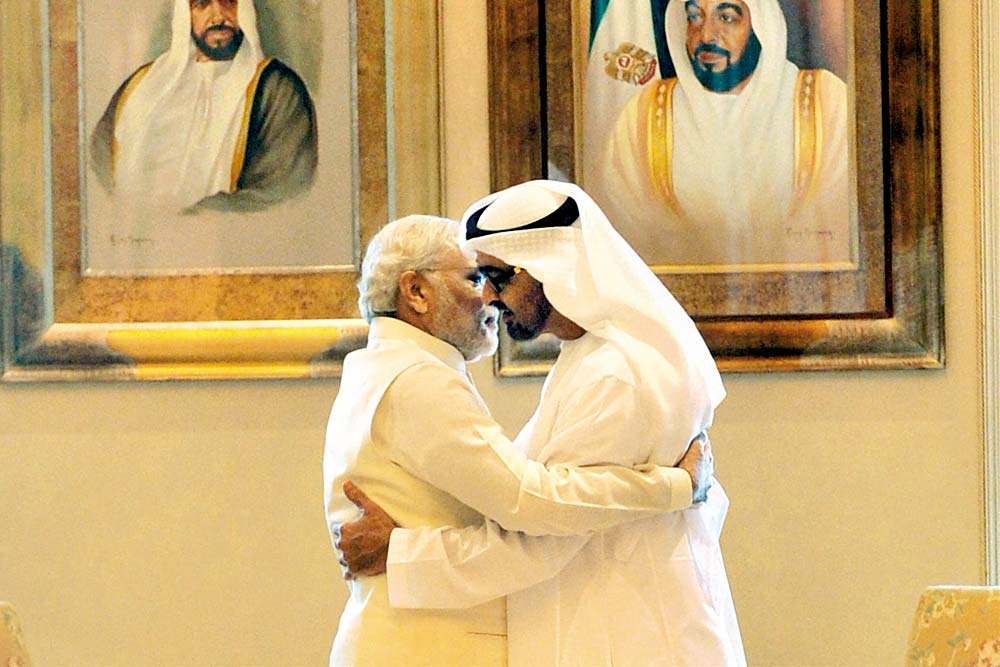Why Is The UAE Crown Prince Visiting India?

NEW DELHI: Are we expecting paradigm shift in India-UAE bilateral relations? Prime Minister Narendra Modi’s visited the Emirates in August last year and led to establishing several MoUs. Appreciating this gesture and further cementing the bond, the Sheikh Mohammed bin Zayed Al Nahyan, the crown prince of Abu Dhabi and deputy supreme commander of the armed forces of the UAE are now visiting India to further boost the ties.
Though India and the UAE have had historical and close ties, no Indian prime minister had visited the Emirates in over three decades, the last one being by the then Prime Minister Indira Gandhi in 1981. What has assumed importance now is the “strategic nature” of bilateral relations between these two traditional friends as they work to forge an overarching and deepening engagement that’s being described as a “strategic government-to-government partnership.”
It’s also a partnership that New Delhi is pushing to move beyond just trade and people-to-people ties though this in no way undermines the role of the 2.5 million-strong Indian diaspora in the Emirates that sends valuable remittances home.
The UAE and India are set to sign a raft of new agreements ranging from Infrastructure investment, renewable energy and insurance to cyber security and cultural cooperation, a top Indian foreign ministry official stated.
“The visit of His Highness Shaikh Mohammad Bin Zayed Al Nahyan, Crown Prince of Abu Dhabi and Deputy Supreme Commander of the UAE Armed Forces, to India, that begins this evening, is one of the highest level visits of the Gulf leadership to India,” said Anil Wadhwa, Secretary East, Indian Ministry of External Affairs.
“This list is still being updated. I cannot give the number right now but as we speak the negotiations are still going on.” The welfare of the expatriate Indians in the United Arab Emirates, numbering around 2.6 million, is also likely to come up for discussion, he said.
Today, Sheikh Mohammed will receive a ceremonial guard of honour at Rashtrapati Bhavan, the official residence of the Indian president. In keeping with tradition, he will then proceed to Raj Ghat, the state memorial for Mahatma Gandhi, where he will sign the visitors’ book and plant a sapling.
Sheikh Mohammed and Mr Modi will have their first meeting at the prime minister’s residence. In the afternoon, the Crown Prince will call on the Indian president, Pranab Mukherjee, who will host a lunch in his honour. Later in the day, Sheikh Mohammed will also meet India’s vice president, Hamid Ansari.
In the evening, Mr Modi will receive Sheikh Mohammed once more for longer and more detailed talks, to exchange memoranda of understanding drawn up by the two delegations. Talks will continue into a working dinner, hosted by the prime minister.
At least 16 agreements are under negotiation between the two countries. But Mr Wadhwa would only describe their subjects in broad terms, saying that it would be premature to go into further specifics until negotiations were concluded.
The agreements propose extended cooperation between India and the Emirates in space research, renewable energy, financial regulation, skills development and cyber security.
Perhaps the most-watched of these agreements involves an effort to help the UAE’s institutional investors fund several major infrastructure projects in India.
On Friday, Sheikh Mohammed will fly to Mumbai. That afternoon, he will visit the Mumbai Stock Exchange to meet executives from financial institutions. He will then attend a reception held by the UAE’s ambassador to India, Ahmed Al Banna, before flying back to Abu Dhabi later that evening.
After Saudi Arabia, the UAE hosts the highest number of Indians in the Gulf, 60 percent of whom are blue collar workers. This is the second highest level visit to India from the Gulf region after the visit of the emir of Qatar in March 2015. The region, which hosts seven million expatriate Indians and is an important source of remittances, has a strong bearing on India's security and stability in its neighbourhood. The UAE is the third largest trading partner of India after the US and China. It is also the sixth largest source of India's crude oil imports.
(The writer is a doctoral student at JNU, New Delhi)



